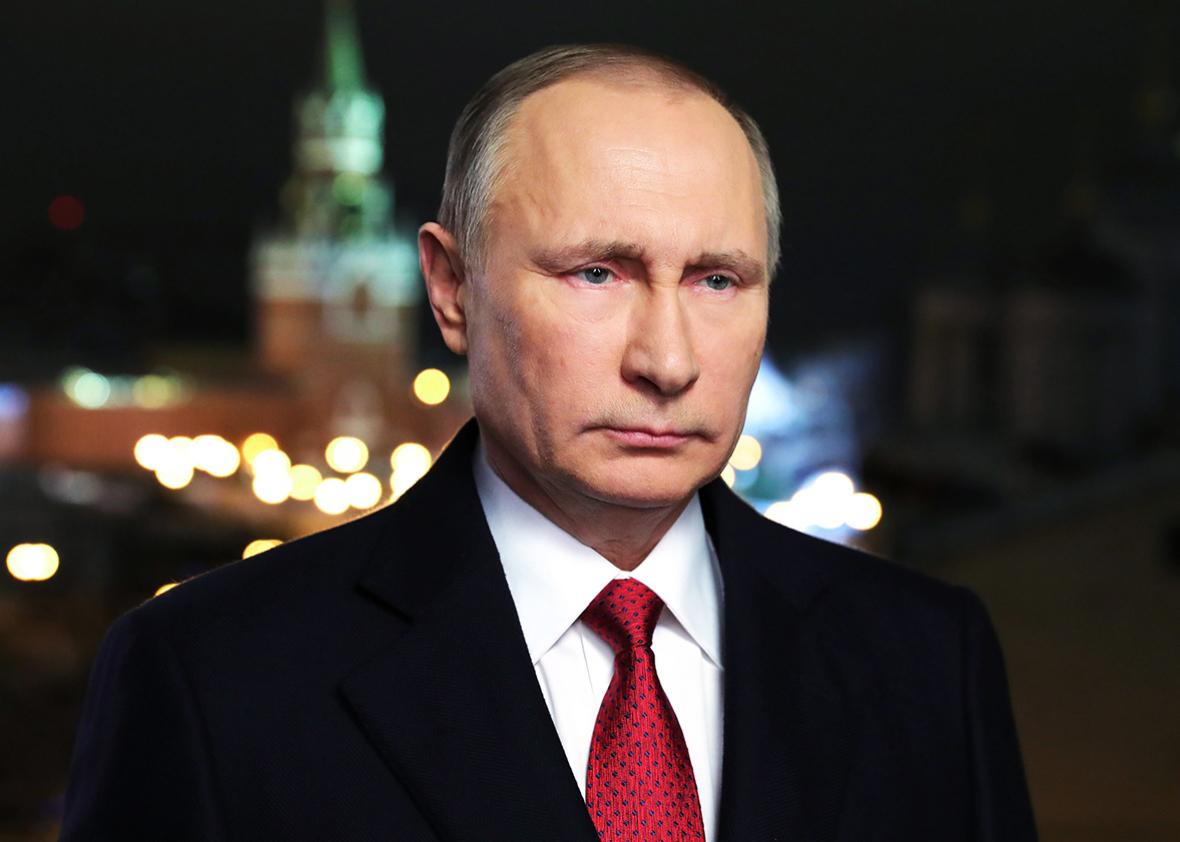The U.S. intelligence community’s report on Moscow’s interference in the 2016 election goes beyond previous summaries. It blames the hacking of the Democratic emails, their dissemination to WikiLeaks, and the wider campaign to influence American voters not merely on the Russian government or on senior Russian officials but on Vladimir Putin personally.
An unclassified version of the report, originally due to be released next week, was suddenly put up on the website of the director of national intelligence Friday afternoon, shortly after the highly classified briefing was delivered to President-elect Donald Trump. The same briefing had been given on Thursday to President Obama, who’d ordered the report shortly after the election.
The public report states that Putin’s goals were “to undermine public faith in the US democratic process, denigrate Secretary Clinton, and harm her electability and potential presidency.” It also states, “Putin and the Russian government developed a clear preference for President-elect Trump.” It adds that the entire intelligence community has “high confidence in these judgments.”
It then states, “Putin and the Russian Government aspired to help President-elect Trump’s election chances when possible by discrediting Secretary Clinton and publicly contrasting her unfavorably to him.” It notes that the CIA and FBI have “high confidence” in this judgment, while the National Security Agency has “moderate confidence.”
The unclassified version doesn’t explain the reasons for this difference nor does it elaborate on the distinction between the first set of conclusions—in which all the agencies have high confidence—and the second set, in which they differ on their level of certainty. One way to read this is as follows. All three agencies have high confidence that Putin sought to undermine trust in American elections and to hurt Clinton, both as a candidate and as the likely president-to-be—and that he came to prefer Trump. But while the FBI and CIA have high confidence that Putin also took active steps to help Trump win, the NSA has only moderate confidence in this position.
Either way, the report puts Trump in an awkward spot. He and many Republicans have emphasized the lack of evidence that Russians interfered with the actual tallying of votes; thus, they say, the whole subject should be dropped. The report agrees on the absence of physical sabotage but says that’s beside the point. The intelligence agencies unanimously view the hacking as part of a broad campaign, directed by Putin, to discredit Clinton among American voters—a campaign that Putin and other Russian officials consider successful.
The unclassified document doesn’t say so, but the Washington Post and NBC News reported Thursday night that the NSA intercepted Russian officials congratulating themselves after Trump won the election. NBC also said that the classified report contains the names of the Russians who delivered the Democrats’ stolen emails to WikiLeaks.
The public version of the report claims, with “high confidence,” that the GRU, Russia’s military intelligence agency, “relayed material it acquired from the DNC and senior Democratic officials to WikiLeaks.” It also states, “The likely financier of the so-called Internet Research Agency of professional trolls located in St. Petersburg is a close Putin ally with ties to Russian intelligence.”
As for Moscow’s primary motive, the report states, “Putin most likely wanted to discredit Secretary Clinton because he has publicly blamed her since 2011 for inciting mass protests against his regime … and because he holds a grudge for comments he almost certainly saw as disparaging him.”
The GRU probably began its “cyber operations” in March 2016, and it had “exfiltrated large volumes of data from the DNC” by May. The report states that Russian intelligence hacked Republican data as well. None of that material has been supplied to WikiLeaks or other media outlets—which some see as another indication that the Russians wanted to damage Clinton but not Trump.
James Clapper, the director of national intelligence, testified to the Senate on Thursday that Russians have long tried to influence democratic processes in the United States and Europe. But the report, which he had a hand in drafting, goes further by saying that their effort to influence the 2016 election marked “a significant escalation in directness, level of activity, and scope of effort.”
The report says no judgment could be made as to whether Putin’s campaign actually affected the outcome of the election. As Clapper said at Thursday’s hearing, such an assessment would go beyond the purview of intelligence agencies. However, the report says that “Moscow will apply lessons learned” from this campaign to future efforts to influence elections worldwide, mainly because they view this “as at least a qualified success” in having an impact on “public discussion.”
*Correction, Jan. 6, 2017: A headline on this article originally misstated that the intelligence community report on Russian hacking was declassified. It is unclassified.
